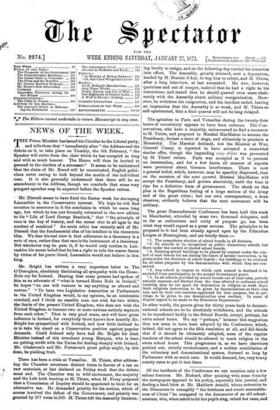The great Nonconformist Conference has been held this week in
Manchester, attended by some two thousand delegates, and so far as enthusiasm and unity of purpose go, has been what they would regard as a great success. The principles to be proposed to it had been already agreed upon by the Education League at Birmingham, and are briefly these :—
"1. The compulsory election of school boards in all districts.
"2. No schools to be recognized as public elementary schools but those under the control of elected school boards.
"3. Existing school buildings to be placed by consent under the con- trol of such boards for use during the hours of secular instruction, to be given under the direction of school boards ; the buildings to be retained for all other purposes by the denominations with which they are con- nected.
" 4. Any school in respect to which such control is declined to be excluded from participation in the annual Government grant.
"5. In all schools provided by school boards out of local rates, periods entirely separate and distinct from the time allotted to ordinary school teaching may be set apart for instruction in religion on week days. Such religious instruction to be given by denominations at their own cost, and by their own teachers appointed for that purpose, but no pri- vilege to be given to one denomination over another. In cases of dispute appeal to be made to the Education Department."
In other words, the grants given for thirty years back to denomi- national schools are to be absolutely withdrawn, and the schools to be transferred bodily to the School Boards, except, perhaps, for extra school hours. We say " perhaps," because this suggestion does not seem to have been adopted by the Conference, which, indeed, did not agree to the fifth resolution at all, and did decide that if it should be ultimately adopted, none of the regular teachers of the school should be allowed to teach religion in the extra school hours. This programme is, as we have elsewhere pointed out, strictly revolutionary, and a sudden annihilation of the voluntary and denominational system, fostered so long by Parliament with so much care. It would demand, too, very heavy county rates to put it into force.


































